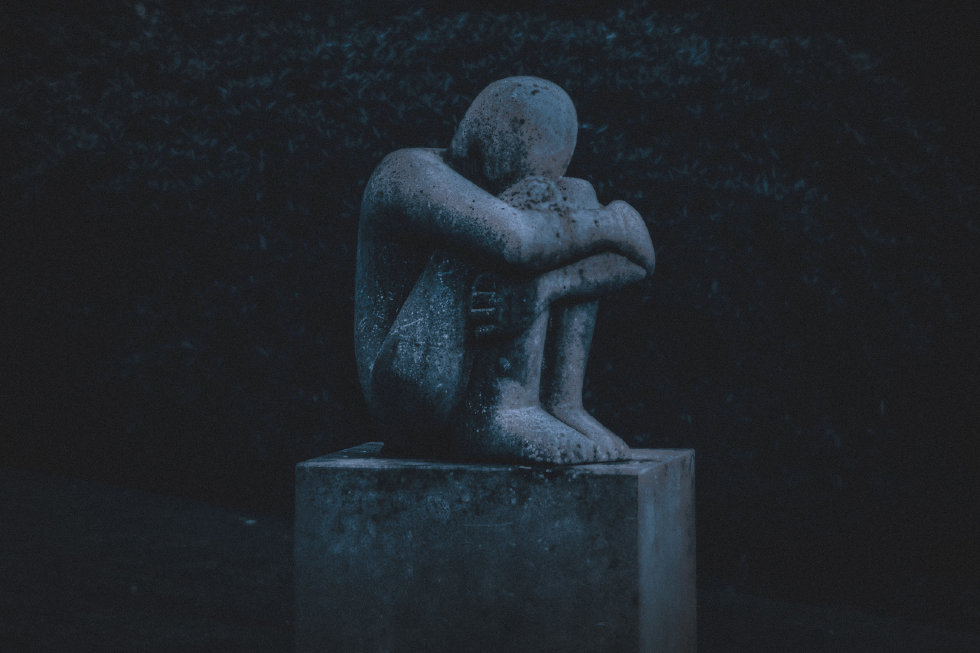Playlist: Disquiet Club Residency #2 – Loss and Solace

“Maybe it’s time to live.” During desperate times, music can be a balm. In a moving playlist about loss, grief, schisms, and what’s left behind, Aaron Williams recounts how he has found solace in the arms of song…
As I attempted to finish Karl Ove Knaussgaard’s ode to his father A Death in the Family, a book that I had previously abandoned due to an unexpected bereavement, it occurred to me that I would describe, with zero hyperbole, the previous six or seven years of my life as something of a ‘Trauma Marathon’.
Near every single act I’ve undertaken has been pushed into the shadows, cast from the lumbering twin colossi of loss and grief. I’ve been existing in the narrow dank valleys that cut between the lofty peaks of seismic personal unrest. Waiting in the shade for the next great cataclysm to deliver swift and unrelenting kicks to my emotional gonads.
Unsurprisingly, I have found myself drawn to art, and in particular music, that centres around such morbidities. Attempting to not only seek solace, but also to process and gain a deeper understanding of my emotional response to the cornucopia of cancer and death that was served up to me on a regular basis.
Bear with me though, the songs I’ve selected for this month’s playlist largely centre around learning to live with the frailty of the human condition, in addition to exploring other forms that loss can take outside of the framework of bereavement. Songs that in essence teach us to accept our inevitable demises with a sly wink, and defiantly rebuke fate by revelling in what the joys we can muster, right here, right now, while we still draw breath.
Spinning Song is the opening track from Nick Cave and the Bad Seed’s first LP fully written and conceived following the death of Cave’s teenage son Arthur. Over gently lapping waves of synthesisers, Cave spins a deeply melancholic yarn about a King whose Queen plants a magical tree, an act that could be interpreted as an allegory for family. The song culminates in a breaking of the fairy tale narrative, as Cave addresses his audience directly: “And you’re sitting at the kitchen table, listening to the radio”; before proceeding to reassure them that he loves them, and that “peace will come in time”.
On New Bikini, Cassandra Jenkins attempts to process the craterous void left in her life after the passing of adored indie rock legend David Berman, who she was due to join on tour as a member of his band Purple Mountains for their self-titled debut. Throughout the song, Jenkins’ friends and family implore her to embrace the holistic benefits of the ocean: “The water, it cures everything”, advice that Jenkins herself eventually passes along to a struggling friend in the final verse. Instrumentally New Bikini possesses a delicate arrangement akin to late era Talk Talk, spacious and sparse, expressive and deeply evocative.
There were few people more adept at setting the unending agonies of existence to folk-tinged indie rock than Frightened Rabbit’s Scott Hutchinson. His music has long been a sanctuary for the heartbroken, a haven of understanding and catharsis for those whose mental health has been poorer than they deserve, which made Hutchinson’s disappearance and death in 2018 particularly upsetting. On Head Rolls Off, a lively cut from 2008’s Midnight Organ Fight, Hutchinson rejects the idea of eternal paradise, instead opting to “Make tiny changes to earth” while he still lives, accepting that even when he does go life will continue regardless.
In the time following the release of Let’s Eat Grandma’s sophomore LP I’m All Ears in 2018, the indie pop wunderkinds and childhood best friends Jenny Hollingworth and Rosa Walton gradually began to drift apart, a schism complicated further by the loss of Hollingworth’s boyfriend to a rare form of bone cancer. Two Ribbons is a lament for failing friendships and lost lovers, in which Hollingworth compares herself and Walton to the titular objects, intertwined yet frayed, desperately clinging to one another. Even likening herself to her deceased partner, she is “translucent” and “bound to two worlds”, neither of which she can truly occupy.
When Phil Elverum lost his wife Geneviève Castrèe to pancreatic cancer, he detailed the minutiae of grief and single parenthood with a diaristic attention to detail so intense that I can barely stand to listen to 2017’s A Crow Looked at Me. On the rambling sprawl of Two Paintings by Nikolai Astrup (from 2018’s follow up Now Only), Elverum uses the works of the Norwegian modernist painter Astrup as a way to continue processing his grief. He sees his own desolation reflected in the figure of a woman, takes a narrative detour into a “plane crash fantasy”, and eventually draws parallels between Astrup’s and Castrèe’s short lives and unfulfilled potential as artists.
On his seventh LP, Carrie & Lowell, Sufjan Stevens examines the complicated relationship he had with his mother, utilising the album as a vehicle to come to terms with her death and to process his grief. Throughout Should Have Known Better, Stevens contrasts the heavy “black shroud” of his grief, one that leaves him fearful and unable to trust himself, with the reality of who his mother was as a person, someone who abandoned him in a video store at the age of three years old. Stevens eventually accepts his inability to change his past, likening his fruitless endeavours to travelling across a “bridge to nowhere”, and instead finds solace in the joy and beauty of his brother’s new-born daughter.
After the esoteric avant-garde folk of 2017’s deeply conceptual Peasant, Newcastle’s own Richard Dawson returns with an altogether more sonically accessible project in the form of 2020, that utilises a broad variety of narrative voices to document “a country in a state of flux”. Fresher’s Ball is the story of how a single father navigates the emotional minefield of dropping his daughter off at university for the first time. Dawson paints a tender and fragile picture of masculinity, tears falling on the drive home, while in the evening the now empty house seems to “hold its breath”. The tale mirrors my own exodus from the family nest, standing in my new student digs, itching for my parents to leave so I could start my new life, blissfully unaware of the situation’s weight as my father struggles to hold back tears.
Functioning as an antithetical sequel to Fresher’s Ball, Los Campesinos!’ The Fall of Home deals with the unique sense of otherness and loss that comes from returning to somewhere you once knew with intense intimacy, only to find it irrevocably altered. The song’s protagonist finds a litany of transgressions have been committed against their past life, from boarded up pubs, to empty high streets and, most worryingly, an increasing number of family and friends falling to illness. Ultimately singer Gareth Paisey asks who are we to kick against time’s inevitable onward march – after all, it was we who left home behind to its fate.
The closing track on Beat the Champ, The Mountain Goats’ 2015 concept album about professional wrestling, is a love letter to the spectacle of performance and an ode to what wrestlers are willing to lose in pursuit of their art. In Hair Match, the song’s protagonist having been defeated is held down, and in an act of ritual humiliation their head shaved as a forfeit in defeat. Yet as the razor is “held aloft and just about to strike”, they experience an epiphany, realising that their love for wrestling has a depth beyond their initial comprehension of the concept of love itself, existing deep within the core of themselves.
Taken from Eels’ second studio album, a record upon which Mark Oliver Everett wrestles with the double cruelty of losing his mother to lung cancer and sister to suicide, we have P.S. You Rock My World. The bittersweet and uplifting closing track from Electro-Shock Blues, is a song about learning to live again after experiencing great trauma. Throughout the track’s duration Everett ruminates upon how having had his life defined by loss for so long, has brought him to the realisation that he needs to make the most of each precious moment. He finds humour in mistaken identity, and reasons to be thankful in small interactions with others, coming to the conclusion that “maybe it’s time to live”.
Aaron Williams
Check out more from Aaron at Disquiet Club
Image: K. Mitch Hodge via Unsplash





